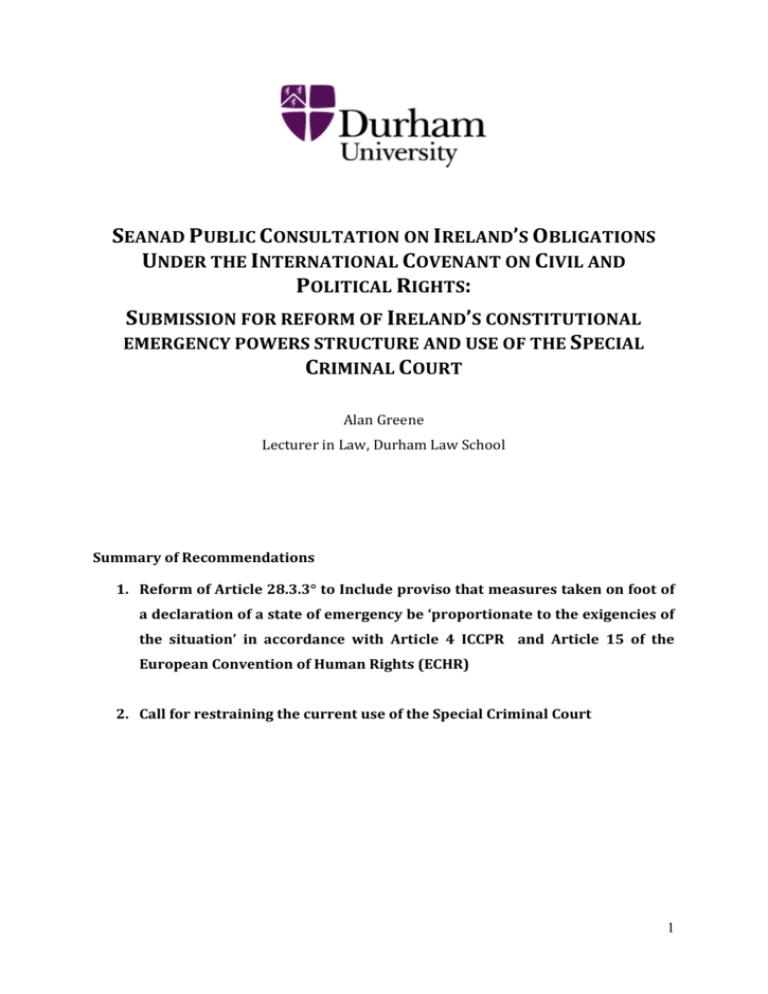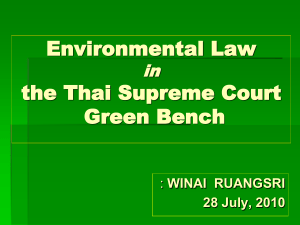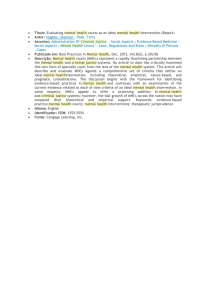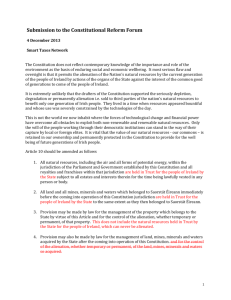Mr. Alan Greene - Durham University
advertisement

SEANAD PUBLIC CONSULTATION ON IRELAND’S OBLIGATIONS UNDER THE INTERNATIONAL COVENANT ON CIVIL AND POLITICAL RIGHTS: SUBMISSION FOR REFORM OF IRELAND’S CONSTITUTIONAL EMERGENCY POWERS STRUCTURE AND USE OF THE SPECIAL CRIMINAL COURT Alan Greene Lecturer in Law, Durham Law School Summary of Recommendations 1. Reform of Article 28.3.3° to Include proviso that measures taken on foot of a declaration of a state of emergency be ‘proportionate to the exigencies of the situation’ in accordance with Article 4 ICCPR and Article 15 of the European Convention of Human Rights (ECHR) 2. Call for restraining the current use of the Special Criminal Court 1 1. REFORM OF ARTICLE 28.3.3° AND IRELAND’S EMERGENCY POWERS SO THAT THE MEASURES TAKEN BE PROPORTIONATE TO THE EXIGENCIES OF THE SITUATION AND THE RECOGNITION OF NON-DEROGABLE RIGHTS Article 28.3.3° in its entirety reads: Nothing in this Constitution other than Article 15.5.2° shall be invoked to invalidate any law enacted by the Oireachtas which is expressed to be for the purpose of securing the public safety and the preservation of the State in time of war or armed rebellion, or to nullify any act done or purporting to be done in time of war or armed rebellion in pursuance of any such law. In this sub-section ‘time of war’ includes a time when there is taking place an armed conflict in which the State is not a participant but in respect of which each of the Houses of the Oireachtas shall have resolved that, arising out of such armed conflict, a national emergency exists affecting the vital interests of the State and ‘time of war or armed rebellion’ includes such time after the termination of any war, or of any such armed conflict as aforesaid, or of an armed rebellion, as may elapse until each of the Houses of the Oireachtas shall have resolved that the national emergency occasioned by such war, armed conflict, or armed rebellion has ceased to exist.1 At present, the only control on the exercise of power under Article 28.3.3° are the discrete conditions – war, armed rebellion or armed conflict – in which a declaration of a state of emergency can be made. Notwithstanding these apparent discrete conditions, Ireland experienced a perpetual state of emergency from the outbreak of World War II on 2 September 1939 until February 1995 when as a reaction to the IRA ceasefire in Northern Ireland the emergency was terminated. Ireland has therefore been in an official state of emergency for longer than it has been in a period of normalcy.2 In comparative terms, Ireland has incredibly broad powers at its discretion in times of emergency that frees the Oireachtas from the constraints imposed on it by constitutional norms, (with the exception of Article 15.5.2° which prohibits introduction of the death penalty) and so confers a carte blanche power on the Oireachtas to make Article 28.3.3°, as amended by the First Amendment of the Constitution Act 1939, the Second Amendment of the Constitution Act 1941 and the Twenty-first Amendment of the Constitution Act 2001. 1 See generally A Greene, ‘The Historical Evolution of Article 28.3.3° of the Irish Constitution’ (2012) 47(1) Irish Jurist 117. 2 2 laws as they see fit.3 One would hope that controls commensurate to such powers would also be present in order to ensure they are used sparingly and that the exception does not become the norm; however, no element of proportionality is required, in stark contrast to Article 4 of the ICCPR or Article 15 of the ECHR. Although the scope of Article 28.3.3° has been somewhat tempered by the Twenty First Amendment of the Constitution Act 2001 which prohibits the introduction of the death penalty even during a state of emergency, the 1996 Group argued that the concept of non-derogable rights should be incorporated into Article 28.3.3° so as to conform to Article 15 of the European Convention of Human Rights (ECHR).4 In addition, the requirement that measures taken on foot of a declaration of emergency be ‘proportionate to the exigencies of the situation’ was also recommended to be included in a newly reformulated Article 28.3.3°.5 Article 4.2 of the ICCPR also stipulates a number of rights that cannot be derogated from. In addition, Article 4.1 of the ICCPR similarly stipulates that the measures taken on foot of a declaration of a state of emergency ‘to the extent strictly required by the exigencies of the situation, provided that such measures are not inconsistent with their other obligations under international law and do not involve discrimination solely on the ground of race, colour, sex, language, religion or social origin.’ It is submitted therefore that Article 28.3.3° should be amended so as to bring Ireland’s emergency powers system in line with Article 4 of the ICCPR and Article 15 of the ECHR. 3 James Casey, Constitutional Law in Ireland, 3rd edn (Round Hall, 2000), 181. Article 15, Convention for the Protection of Human Rights and Fundamental Freedoms (European Convention on Human Rights, as amended by Protocols 11 and 14), June 2010. 4 Report of the Constitution Review Group (n Error! Bookmark not defined.) 18. Ó Dálaigh’s papers from 1976 also include a note regarding interpreting Arti.28.3.3° in a manner consistent with Article15 of the ECHR by insisting that such emergency measures be proportionate. See IE UCDA P51/209. Re balancing the carte blanche nature of Article28.3.3° with the contradictory affirmation of constitutional rights that are ‘antecedent and superior to all positive law’ is also advocated by Desmond Clarke. See Desmond Clarke, ‘Emergency Legislation, Fundamental Rights and Article 28.3.3° of the Irish Constitution’ (1977) 12 (2) Irish Jurist 217. It should be noted, however, that although the European Court of Human Rights examines both the existence of a state of emergency and the measures taken on foot of such a declaration, it prefers to focus on the latter question. This arguably results in the threshold of severity which a crisis must meet in order to justify declaring a state of emergency in accordance with Article 15 of the ECHR being set very low, constituting merely a formal procedural barrier to cross. See Alan Greene, ‘Separating Normalcy from Emergency: The Jurisprudence of Article 15 of the European Convention on Human Rights’ (2011) 12 (10) German Law Journal 1764. 5 3 Furthermore, the Constitution should delineate certain non-derogable rights that the state cannot depart from in a period of emergency. Particularly important in this regard is the right to be free from torture, or cruel, inhuman or degrading treatment or punishment as set out in Article 7 ICCPR, Article 3 ECHR and in the UN Convention against Torture. This ‘anti-torture norm’ is integral to the value of human rights protection and so is accorded the status of jus cogens in international law.6 Amending Article 28.3.3° of the Irish Constitution to include non-derogable rights and the requirement that measures taken are proportionate to the exigencies of the situation would therefore bring Ireland in line with their legal obligations under international human rights law. 2. CALL ON RESTRICTED USE OF THE SPECIAL CRIMINAL COURT Article 38.3.1° permits the establishment of special courts in Ireland when ‘the ordinary courts are inadequate to secure the effective administration of justice, and the preservation of public peace and order.’ Notwithstanding the exceptional nature of such courts that is clearly evident from the wording of Article 38.3.1° and the drafting history of the Constitution, it is not an exaggeration to state that the Special Criminal Court has become a permanent feature on the Irish legal landscape.7 The power to introduce Special Criminal Courts was first enabled by legislation in Part V of the Offences against the State Act 1939 (OASA 1939); less than two years after the entry into force of the Constitution. The OASA 1939 is a piece of permanent legislation; however, the exceptional nature of the Special Criminal Courts is affirmed by virtue of the fact that Part V of the legislation which enables the establishment of such courts ‘shall not come into or be in force save as and when and for so long as is provided by the subsequent sub-sections of this section.’ S.35(2) of Part V of the OASA 1939 empowers the Government to assess whenever ‘the ordinary courts were inadequate to secure the effective administration of justice’. The current manifestation of the Special Criminal Court, which is noticeably demilitarised when See generally, Erika de Wet, ‘The Prohibition of Torture as an International Norm of jus cogens and its Implications for National and Customary Law’ (2004) 15(1) European Journal of International Law 97. 6 7 Greene (n 2) 119-121. 4 compared to that envisaged when the OASA 1939 was drafted, was established by a Government declaration dating from 26 May 1972 (over 40 years ago) in reaction to the escalating crisis in Northern Ireland. The UN Human Rights Commission has previously highlighted Ireland’s profligate use of the Special Criminal Court as a concerning development, in particular noting its potential damaging effect on the right to a fair trial under Article 14 ICCPR.8 Mary Robinson in 1974 also highlighted the use of the Special Criminal Court as potentially leading to the dissolution of the right to trial by jury through the back door. 9 Indeed, rather than curtail the use of the Special Criminal Court as a result of the concerns of the UN Human Rights Commission, recent legislative changes have instead expanded its scope. The Criminal Justice (Amendment) Act 2009 (CJAA 2009), it is submitted, represents a particularly striking example of an expansion in the Special Criminal Court’s jurisdiction.10 Although the Special Criminal Court was originally established to deal with terrorist offences, the CJAA 2009 created a number of new offences pertaining to organised crime which could be referred to the Special Criminal Court. The effect of such an act is, as stated explicitly by section 8(1) of the CJAA 2009, that ‘the ordinary courts are inadequate to secure the effective administration of justice and the preservation of peace and public order’ in relation to organised crime. From the case law on the necessity of the Special Criminal Court, it is clear that the power to control the use of the Special Criminal Court lies with the Oireachtas. In Re MacCurtain,11 the High Court and subsequently the Supreme Court rejected an argument that section 35(2) was an unconstitutional delegation of legislative authority onto the executive. In the High Court, Duffy J stated that: Human Rights Committee Concludes Sixty-Ninth Session, HR/CT/587, www.un.org/News/Press/docs/2000/ 8 20000728.hrct587.doc.html. 9 Mary Robinson, The Special Criminal Court (Dublin University Press 1974). See generally, A Greene, ‘Shielding the State of Emergency: Organised Crime in Ireland and the State’s Response’ (2011) 62(3) Northern Ireland Legal Quarterly 249. 10 11Re MacCurtain [1941] IR 83. 5 The Oireachtas clearly considered the Government to be the authority best situated, from its position and the information at its disposal, to determine whether or not Special Tribunals were necessary in the circumstances set out in the section. In my opinion the provision that the Government may make such a proclamation when satisfied that the ordinary Courts are inadequate is clearly meant to be an essentially executive decision of the highest executive authority in the State.12 Duffy J continued by holding that the Government had no obligation to disclose the reasons as to why it reached such a decision.13 In Kavanagh v Ireland,14 the Supreme Court elaborated upon the political nature of the decision to establish special courts, Barrington J stated that: [T]he question of whether the ordinary courts are or are not adequate to secure the effective administration of justice and the preservation of public peace and order is primarily a political question, and for that reason, is left to the legislature and the executive.15 Only if mala fides on the part of the Executive can be shown, will the decision to establish Special Criminal Courts be reviewable by the courts.16 However, the lack of a requirement to adduce reasons justifying this finding makes any scrutiny of this decision by the judiciary impossible. This has led the UN Human Rights Committee to declare that judicial review of the decision to establish Special Courts is ‘restricted to the most exceptional and virtually indemonstrable circumstances.’17 notwithstanding the provision in s.35(5) that Dáil Éireann at any time can pass a resolution annulling the Government’s decision to establish such courts. It is submitted therefore that the capacity to curtail the scope of the Special Criminal Court lies with politicians. This is also reflected by the CJAA 2009 which contains a yearly renewal clause designed to 12 ibid at 86. 13 ibid at 86. 14 Kavanagh v Ireland [1996] 1 IR 321. 15ibid 354. 16ibid 361. See Kavanagh v. Ireland, Para. 10.2 CCPR/C/71/D/819/1998 (26 April 2001) Available at http://www.humanrights.is/the-human-rightsproject/humanrightscasesandmaterials/cases/internationalcases/humanrightscommittee/nr/291 17 6 reinforce its temporariness and therefore exceptionality. To date it has been renewed annually with it next up for renewal on 29 June 2014. In line with Ireland’s obligations under Article 14 ICCPR, it is submitted therefore that Ireland’s use of the Special Criminal Court ought to be critically reviewed. In particular, the recent expansion of the Court’s jurisdiction away from terrorist offences to organised crime which poses a much less serious risk to the state’s security is a worrying development from a human rights perspective. The assertion that organised crime can render the ‘ordinary courts inadequate to secure the effective administration of justice’ is one that inspires little faith in the Irish courts structure, particularly when such a declaration refers to organised crime as distinct from terrorism or other threat to national security. Alan Greene Lecturer in Law Durham Law School, PCL 219 Stockton Road Durham DH1 3LE Email: alan.greene@durham.ac.uk 7








